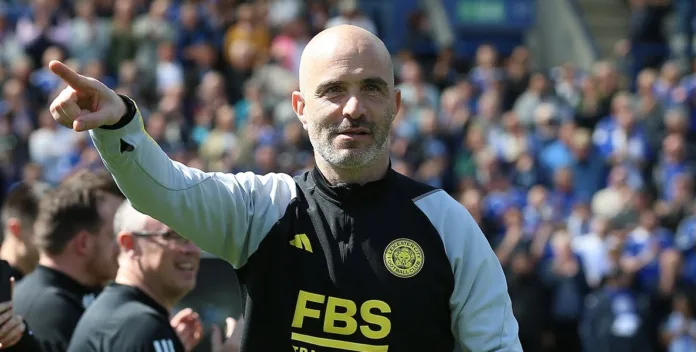Chelsea appoints Enzo Maresca, former Leicester manager, to replace Pochettino despite his limited experience in top-tier football.
Enzo Maresca has agreed to a five-year deal to become Chelsea’s new head coach. The decision comes after Mauricio Pochettino’s exit following Chelsea’s failure to secure a top-four finish. Maresca, who managed Leicester City in the Championship, steps into the Premier League with significant expectations.
Upon arriving at Leicester, Maresca made a symbolic change by honouring Claudio Ranieri’s 2016 Premier League triumph at the club’s training ground. This gesture demonstrated his respect for the club’s history. Despite managing fewer than 70 senior matches, including 53 in England, Maresca will lead Chelsea with a vision inspired by his experiences under Pep Guardiola.
Maresca’s appointment mirrors Ranieri’s arrival at Chelsea in 2000, with immediate demands to qualify for the Champions League. Chelsea’s owners aim to revive the club’s competitive edge, seeking not only success but also an attractive style of football based on possession and dominance. Maresca’s adherence to Guardiola’s philosophy plays a crucial role in this decision.
At Leicester, Maresca implemented a Manchester City-like style of play, focusing on patient build-up and controlled possession. His influence was evident as Leicester’s forward-pass proportion ranked among the lowest in the Championship, second only to Southampton. This approach aligns with Chelsea’s desire for a possession-based game, reminiscent of Guardiola’s tactics.
Jordan Blackwell, Leicester’s correspondent, highlighted Maresca’s tactical acumen and his success in embedding Guardiola’s style at Leicester. Maresca’s innovative use of inverted full-backs, such as Ricardo Pereira’s role, showcased his adaptability and tactical ingenuity. This tactical flexibility could benefit Chelsea, particularly with players like Marc Cucurella, who thrived in a similar role under Pochettino.
Building from the back remains a cornerstone of Maresca’s strategy. At Leicester, he signed goalkeeper Mads Hermansen, who excelled both as a shot-stopper and in playing out from the back. This approach allowed Leicester to transition smoothly from defence to attack, with Kiernan Dewsbury-Hall emerging as a key creator.
Maresca’s emphasis on one-on-one duels in the final third mirrors Guardiola’s and Mikel Arteta’s styles. Players like Stephy Mavididi and Abdul Fatawu thrived under Maresca’s guidance, engaging in numerous one-on-one battles. This strategy aligns with Chelsea’s need for dynamic wingers who can challenge defenders and create scoring opportunities.
Despite his success, Maresca faced challenges at Leicester. His commitment to his playing style led to friction with fans and a lack of a perceived Plan B. However, his methods garnered respect from players like Harry Winks, who praised Maresca’s unique tactical insights. Winks noted that Maresca’s teachings offered fresh perspectives, even to experienced players.
Maresca’s determined and sometimes stubborn approach will likely remain at Stamford Bridge. His public persona, however, may need adjustment to navigate Chelsea’s demanding environment. Communication issues with Leicester’s management highlighted potential challenges, but Maresca’s focus on coaching and tactical organization aligns with Chelsea’s requirements.
Chelsea’s board seeks a manager capable of competing with top-tier coaches like Guardiola and Arteta. Maresca’s deep understanding of Guardiola’s philosophy and his successful implementation of it at Leicester position him as a promising candidate. His journey from a promising coach to Chelsea’s head coach marks a significant step, with both challenges and opportunities ahead.
Analysis:
Enzo Maresca’s appointment as Chelsea’s head coach marks a bold move by the club, aiming to blend tactical innovation with high expectations. His experience under Pep Guardiola and his successful implementation of a possession-based style at Leicester City provides a solid foundation for his new role. However, this decision involves significant risks and rewards, analyzed through various perspectives.
From a political perspective, Maresca’s appointment reflects Chelsea’s strategic direction. The club’s owners are willing to take risks to revive Chelsea’s competitive edge. This move signals a departure from traditional, experienced managers, embracing a new approach that prioritizes tactical innovation. Maresca’s ability to navigate Chelsea’s internal politics and align with the club’s vision will be crucial for his success.
Sociologically, Maresca’s arrival brings a fresh dynamic to Chelsea’s squad. His emphasis on possession and tactical discipline may foster a cohesive team environment. However, his relatively rigid approach to tactics could challenge players accustomed to more flexibility. Balancing his methods with player expectations and team morale will be essential for sustained success.
Economically, Maresca’s appointment underscores Chelsea’s investment in long-term success. The five-year contract suggests a commitment to building a stable and competitive team. Maresca’s focus on developing young talent, as seen with Cole Palmer at Manchester City, could yield significant returns. However, the financial implications of potential early exits or conflicts with management highlight the risks involved.
Locally, Maresca’s appointment may influence fan engagement and support. His respect for club history, as demonstrated at Leicester, may resonate with Chelsea fans. However, his public persona and past conflicts with Leicester’s management could affect his relationship with the Chelsea faithful. Building a positive rapport with fans will be vital for long-term support.
Gender and minority perspectives highlight the broader implications of Maresca’s appointment. As a relatively young and progressive coach, his success could pave the way for more diverse and innovative leadership in football. However, ensuring inclusive practices and fostering a positive team culture will be essential to address any potential biases or challenges.
In conclusion, Enzo Maresca’s appointment as Chelsea’s head coach represents a strategic gamble with significant potential. His tactical expertise and adherence to Guardiola’s philosophy align with Chelsea’s vision for an attractive style of play. However, navigating internal politics, managing player dynamics, and fostering fan support will be critical for his success. As Chelsea embarks on this new chapter, Maresca’s ability to balance innovation with pragmatic leadership will determine the club’s trajectory in the coming years.
